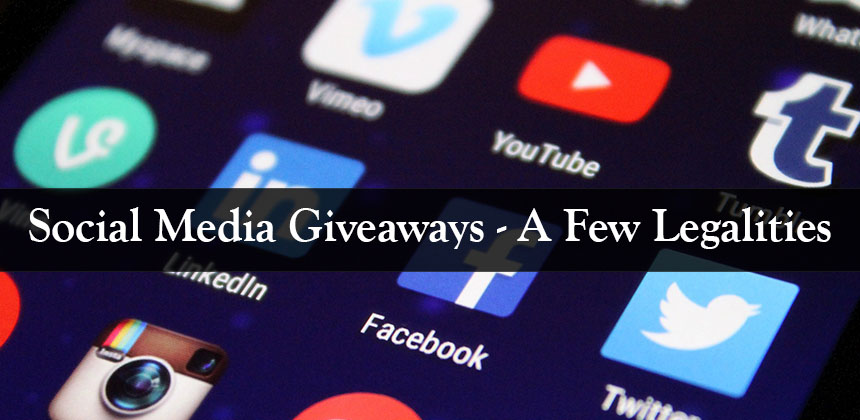
Hosting a giveaway as a way to drum up a company’s business is a practice that goes back to the days of Ancient Rome, if not further. Because no matter how advanced our technology is, or how sophisticated our customer models are, there’s still one rule we can always count on — people love free stuff.
Thus, it only makes sense that a company operating with the power of social media would want to use this technique to grow their business. However, before you decide to make a post on your business’s Facebook page that you’re hosting a giveaway, you should be aware that you’re diving into some deep legal waters by hosting a giveaway. While this may be shocking to consider, the truth is that if you are one of these businesses and are not careful when hosting a social media giveaway, you might find that hosting your giveaway was significantly more trouble than it was worth.
Social Media Giveaways: Legalities You Need to Know
Giveaways are regulated both at the state and federal level, and whether you’re aware of the laws that govern them or not, you’re still bound by them. Which is why, before you host any giveaways, you need to understand the rules you’re agreeing to play by.
When it comes down to figuring out the legalities surrounding your giveaway, the categorization of the giveaway is what tends to cause the most trouble.
Classification: Lottery vs. Sweepstakes vs. Contest
Lotteries
A giveaway can sometimes be classified as a lottery. More specifically, a giveaway can sometimes be classified as an illegal lottery.
To classify as a lottery, the elements of chance, prize and consideration need to be present. For something to be considered a lottery, there has to be a prize (something of value) in which the winner is selected at random. Additionally, to be considered for that selection, the player must have parted with something of value in exchange for the chance to play.
Sweepstakes
Most businesses who put together a giveaway, in order to avoid running an illegal lottery, do so by avoiding consideration. What this means is that they will still have a prize that is selected at random, but no cost to enter the drawing. An example of this is quite common on social media and can be along the lines of: “like this post to enter for a chance to win X,Y,Z.” These kinds of giveaways are usually referred to as a form of sweepstakes, instead of a lottery.
Contests
Another form of classification that is frequently used is a contest. This way, the business will eliminate consideration and chance altogether – making winning a test of skill. These giveaways are called contests because there’s a task that has to be completed in order to enter.
Sweepstakes and contests are generally legal — though many states have additional rules pertaining to how one of these events can be handled. For example, Florida and New York are two states that require a bond to be posted if the prize being given away is worth more than $5,000. Rhode Island also has laws that are more restrictive than other states when it comes to giveaways.
Additional Rules: Beware of the Fine Print
Depending on where you operate your business out of, there may be some additional rules to be aware of. One of these rules that are quite common is the requirement to have terms and conditions put in place. These rules generally need to articulate how your giveaway works. You need to disclose w someone can enter, what the prize being offered is, whether alternatives will be allowed, when the giveaway begins, and when it officially ends. Further, may times these rules also are recommended to lay out how a winner will be chosen, what the approximate odds of winning are, and whether there are any locations where the giveaway is not valid.
Are Giveaways Really Worth It?
Whether or not you believe it, after digging through all that text, the answer is general, yes. While it can be difficult making sure a giveaway obeys all the rules, once you’re familiar with those rules, the hard work is behind you. And while giveaways do come with a lot of red tape, they remain an effective way to get a lot of people’s interest in a short period of time.
Conclusion
If you are starting a giveaway or are even considering doing so, it is highly recommended that you consult with a business lawyer that has experience in giveaways. For more information on giveaways, and how you can protect your business, simply contact us today!
—
Julian Cordero is an Attorney, Business Strategist, and Music Producer. Oh and he blogs too! Julian is licensed to practice law in New York and is the Managing Attorney of Cordero Law LLC, a New York City based law firm focusing on Business Law, Entertainment Law, and Intellectual Property Law.
